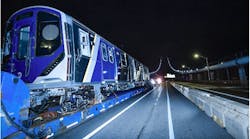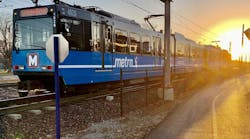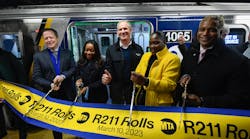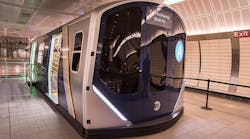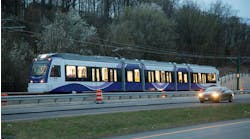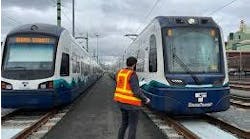OP-ED: Fifty years later, new subway cars will come to Staten Island thanks to FTA funding
Let us give thanks to Washington, D.C., via the Federal Transit Administration (FTA) for providing critical funding to the New York Metropolitan Transportation Authority (MTA) that paid for the latest new subway cars purchased on behalf of New York City (NYC) Transit. The first 10-car train set went into service on March 10, 2023, on the A line for a 30-day in service test period. After successful completion of this test, additional cars are in the process of going into passenger service.
A series of FTA grants to the MTA over several years paid for most of the base bid of $1.44 billion awarded to Kawasaki to purchase 535 new state of the art R211 subway cars. They will primarily replace a similar number of subway cars currently operating on the NYC Transit A and C subway lines, along with the Staten Island Railway that have reached their useful life. Delivery for all 535 cars, including 75 for Staten Island Rapid Transit Operating Authority (SIRTOA), is anticipated to be completed before the end of 2024. This assumes there are no additional project delays.
The MTA recently removed dozens of new R211 subway cars previously in transit service due to faulty gear boxes. Depending upon how long it takes to resolve this issue, there could be more delays in future deliveries for the balance of new subway cars. This could include those that have been allocated for assignment to SIRTOA.
There will be a total of 1,175 new subway cars purchased at a cost of $3.2 billion. The balance of 640 cars are anticipated to all be delivered by December 2026. Future FTA funding will also pay for many of these cars, as well. Previous subway car procurements, like the current one, suffered from delays of several years during plant production, inspection, acceptance, testing and delivery before riders could reap the benefits.
In 1971, the passenger operations of the former B&O Rail Road Staten Island Rapid Transit Railway Company were sold to NYC for $3.5 million. Later that year, NYC passed on control to the MTA. The MTA created a subsidiary, the SIRTOA. It is managed by the MTA NYC Transit's Department of Subways. SIRTOA would be the step child to NYC Transit receiving hand me downs or some of the oldest subway cars in the fleet. The R44 cars assigned to SIRTOA were refurbished in 1991 and 1993, along with being rebuilt between 2007 and 2010. SIRTOA operates on Staten Island's south shore with 21 stations along a 14-mile route between the St. George NYC Department of Transportation Staten Island Ferry St. George Ferry Terminal. Fares are only collected at the St. George and Tompkinsville Stations. There are approximately 15,000 weekday riders.
Since 1971, primarily MTA funding was used for capital improvements. Years later, the MTA initiated using Federal Transit Administration funds for some SIRTOA capital investments. This has resulted in investing more than $200 million in FTA funding for SIRTOA capital improvements.
There is even more good news from Washington when it comes to transit funding. On Oct. 10, the FTA posted a Notice of Funding Opportunity (NOFA): Solicitation of Project Proposals for the Fiscal Year (FY) 2024 Rail Vehicle Replacement Grant Program. This program provides $197 million of FY 24 funds for Rail Vehicle Replacement Grant Program. The source is from FTA Section 5307 State of Good Repair Program funds. These funds will pay for any transit agencies plan to replace rail vehicles that are approaching or have exceeded their useful life. This grant program supplements other traditional annual formula grant programs.
It is, in essence, winning extra funding from Washington. You have to be in it to win it. MTA FTA grants managers have been previously successful going back decades in winning national competitive discretionary grants. I'm confident MTA staff will submit a proposal on or before the Dec. 18, 2023, submission deadline.
Both the MTA and FTA have their own respective Project Management Oversight (PMO) independent engineering consulting firms to supplement in house staff. They are monitoring and providing oversight on this car procurement. They also provide technical assistance to NYC Transit staff managing the project. These engineering firms prepare monthly reports, which provide detailed information on the progress of this subway car procurement. These reports are made available to the MTA Chairman Janno Lieber, NYC Transit President Richard Davey, NYC Transit Chief Engineer, NYC Transit Subway Car Project Manager, FTA New York/New Jersey Region 2 and Washington, D.C., headquarters staff..
NYC Transit has a fleet of 6,500 subway cars with 471 stations, serving 5.5 million pre COVID-19 riders. Close to 4 million daily riders have returned. Service is provided on 28 routes spanning four of five boroughs comprising NYC, including Brooklyn, Bronx, Manhattan and Queens. Only the 500,000 residents of Staten Island have no direct subway connection to the rest of NYC. Traveling via the Staten Island Ferry on a 25 minute ride to the Whitehall Street, Manhattan Terminal provides easy access to the NYC Transit #1, R or W subway lines. Traveling via bus over the Verrazzano Bridge to either the NYC Transit 95th or 86th 4th Ave. R subway line stations.
There are also a series of NYC Transit Express buses connecting various Staten Island neighborhoods to downtown and midtown Manhattan east and west side. Finally, there is a private ferry operator managed by the NYC Economic Development Corporation that provides service between the St. George, Ferry Terminal and midtown west 38th St. Ferry Terminal.

Larry Penner
Larry Penner is a transportation advocate, historian and writer who previously served as a former director for the Federal Transit Administration Region 2 New York Office of Operations and Program Management. This included the development, review, approval and oversight for billions in capital projects and programs for New Jersey Transit, New York Metropolitan Transportation Authority, NYC Transit bus, subway and Staten Island Railway, Long Island and Metro North railroads, MTA Bus, NYCDOT Staten Island Ferry along with 30 other transit agencies in New York and New Jersey.

